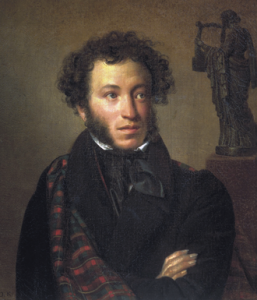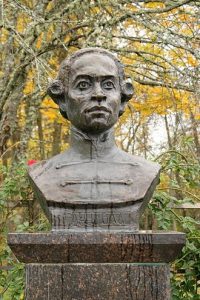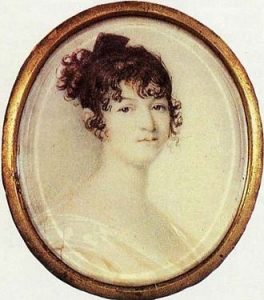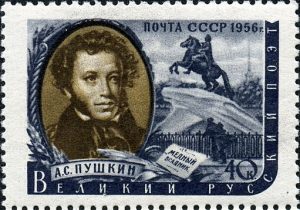Muireann Maguire, Senior Lecturer in Russian
It’s difficult to convey just how vital Aleksandr Pushkin (1799-1837) is to Russian culture. When explaining Pushkin to students or foreigners, Russians often say ‘Pushkin is our everything [nashe vse]’. Major public spaces like the Pushkin State Museum of Fine Arts and Pushkin Square, both in Moscow, emphasize the poet’s centrality; not far from the Kremlin and the offices of the famous news agency TASS, you can see statues of Pushkin and his bride Natalia Goncharova just beside the church where they married in 1831. In Russia’s second city, St. Petersburg, you’ll find the neoclassical Pushkin House, Russia’s main institute for literary research, where generations of Soviet and Russian scholars trained; you can visit the beautifully maintained apartment-museum near the Neva River which was Pushkin’s home for the last year of his life. Lines from Pushkin’s poems and plays are catchphrases in modern speech; more mundanely, if a job doesn’t get done, someone will ask, ‘Who’s going to do it? Pushkin?’ If something goes missing, the next question is, ‘Who took it? Pushkin?’ It’s a sly way to acknowledge the poet’s ubiquity: Pushkin really is ‘everything’ in spoken and written Russian. Although best known as a poet, he made every major literary genre his own (including lyric and narrative poetry, drama, the novel, the short story, even historical prose); he was instrumental in the development of literary Russian by skilfully combining the rhythms and structures of ordinary conversation with French-derived vocabulary and syntax to refresh and diversify his native language. Not only would Russian literature look very different without Pushkin; even its words would be poorer.

And yet – Pushkin was Black. Or as he phrased it in a note to Emperor Nicholas II of Russia in 1831, ‘no Russian man of letters except me can count a Negro [negr] among his ancestors’. Pushkin’s great-grandfather was a Black African, captured by slave traders in the region of present-day Cameroon, and sold in 1704 at the age of seven or eight to Russia’s inventive and ambitious Tsar Peter I, known as Peter the Great. Baptized Abram, he became Peter’s godson and protégé; he studied in Europe, mixed in French Enlightenment circles, trained as a military engineer, and died with the rank of general. Impressed by the career of the Carthaginian general Hannibal, Abram adopted his surname. He had two wives and eleven children. His granddaughter, Nadezhda Gannibal, known as ‘the beautiful Creole’, married into a minor but ancient noble family, the Pushkins. Her first son was Aleksandr Pushkin.

Pushkin was very conscious of his Black ancestry; his poems reveal fierce pride in and fascination with his heritage. Sometimes he lamented negative traits he associated with Black identity – usually ugliness or wildness – but he clearly valued the qualities of freedom and difference which he also saw as integral to Abram Gannibal. In 1827, aged twenty-eight, he began writing his great-grandfather’s biography, which he planned to call The Blackamoor of Peter the Great (Arap Petra Velikogo); Pushkin used the terms ‘Negro’ [negr] and ‘blackamoor’ [arap] interchangeably and without any sense of stigma. Pushkin never wrote more than seven chapters of the biography, and he published only the first two, much later, in 1834. His text shows remarkable sensitivity both to European spectators’ curiosity about the exotic ‘blackamoor’ in their midst and to Ibrahim’s awareness of their regard. Ibrahim (as Pushkin re-names his great-grandfather Abram in the book) is rarely appreciated for his personality; his performance of Blackness inevitably overshadows his identity.

‘Ibrahim’s arrival, his appearance, his education and his natural wit roused universal attention in Paris. All the ladies wanted to see le Nègre du czar at their receptions; the regent invited him more than once to his jolly evenings; he attended suppers enlivened by the youthful Voltaire and the aged Chaulieu, by the conversation of Montesquieu and Fontenelle; he missed not a single ball nor a single festivity, not one first performance, and he gave himself up to the whirlwind with all the ardour of his age and his race. [….] People usually regarded the young Negro [negr] as a wonder, surrounding him and showering him with greetings and questions, and this curiosity, although superficially well-disposed, offended his self-esteem. The sweet attention of women, perhaps the only goal of our strivings, not only failed to gladden his heart but even filled with sorrow and indignation. He felt that for them he was like some rare breed of beast, a unique creation, alien, accidentally brought into the world, having nothing in common with them. He even envied people whom nobody noticed, considering their insignificance to be good fortune.’
This extract from Chapter One demonstrates how clearly Pushkin empathized with what he perceived to have been his great-grandfather’s fate: public notoriety, private isolation. Pushkin’s own predicament was similar: he too felt isolated within his generation, and not merely because of the supposedly ‘African’ hair and facial features he had inherited. His vast talent, his awareness of that talent, his strong sense of social justice, and his equally strong sense of entitlement as a poet and as a Russian nobleman made him fiercely proud of who and what he was – without ever inuring him to the slanders and hypocrisies of everyday life. When a poetic rival, Faddei Bulgarin (here parodied by Pushkin as ‘Fiddlyarin’) mocked Abram Gannibal’s memory by suggesting that a drunken Peter the Great had bought him for a bottle of rum, the poet responded fiercely. (Bulgarin also slandered Pushkin’s mother by referring to her as a mulatka, or mulatto, a term Pushkin did find pejorative.) Pushkin wrote:
Fiddlyarin, sitting there at home,
Claims my black forebear Hannibal
Passed, for just one flask of rum,
Into the hands of some old salt.
Well, this old salt was that great captain
Who gave us fitting cause for pride,
Who gave, with mighty hand, our nation
An impulse not to be denied.
That captain loved my great-grandfather;
The purchased negro [arap], but no slave,
Grew up to highest ranking rather,
Tsar’s confidant, among the brave. (from ‘My Pedigree’, 1830)
Instead of apologizing for his ancestor’s Blackness, or trying to hide his time as a slave, Pushkin emphasizes both aspects to his family history. The ‘great captain’ is Tsar Peter the Great, and Abram Gannibal is the ‘purchased negro’ who rose to high status in Peter’s nation. Sadly, despite the inclusiveness of Soviet rhetoric on race, Russia’s engagement with Black nations and individuals since Pushkin’s time has been marred by Cold War power games and casual racism. Nonetheless the example of Pushkin – who is, after all, Russia’s ‘everything’ – reminds us that Black history is to be remembered, and celebrated, with pride.

To find out more about Pushkin’s short and tempestuous life, and why he became ‘our everything’, you could do worse than read Catriona Kelly’s Russian Literature: A Very Short Introduction (Oxford University Press, 2001), or for an even briefer explanation, I recommend the introduction to Antony Wood’s new Aleksandr Pushkin: Selected Poetry (Penguin Classics, 2020) – the extract above from ‘My Pedigree’ comes from this volume. The translation of a passage from Pushkin’s The Blackamoor of Peter the Great is my own.
Recent Comments